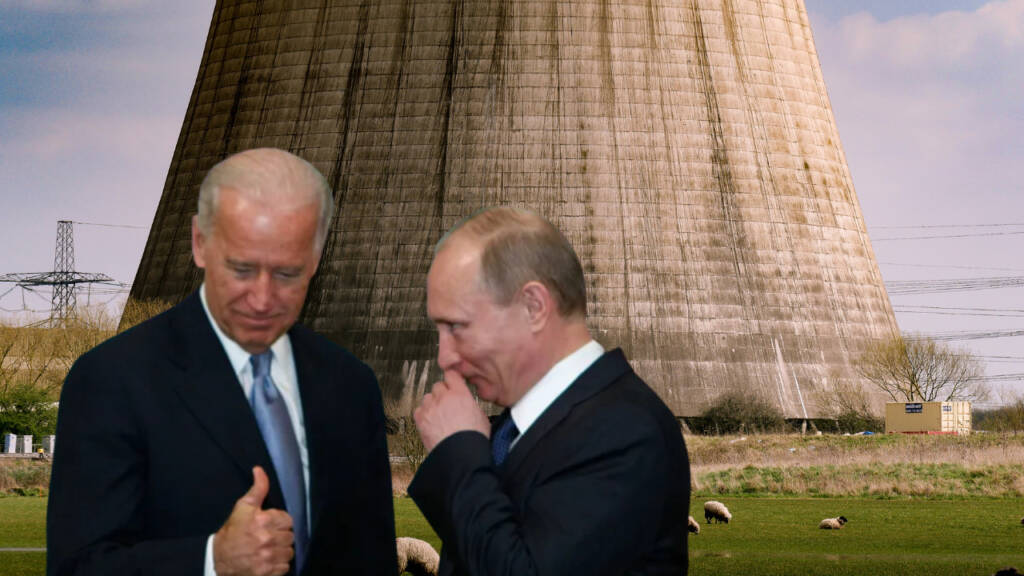Isn’t this the ultimate irony? The pot calling the kettle black, or rather, Uncle Sam wagging a finger at the world for a vice it indulges in behind closed doors. It is audacious for the United States, which has been vehemently rallying the world to sever ties with Russia, to be heavily dependent on Russia for its nuclear energy needs. And yet, here we are, Joe, you’ve outdone yourself in the hypocrisy department.
Dependent Uncle Sam
The facts are as stark as they are shocking. According to a recent report in the New York Times, American companies import nearly $1 billion worth of uranium from Russia each year. This is despite the countless sanction packages by Washington and the EU aimed at debilitating Russia’s economy. Conveniently, nuclear fuels have been the one item conspicuously missing from these sanction packages.
Sanctions on oil, gas, and coal? Check. Sanctions on uranium? Not quite. If this isn’t hypocrisy wrapped in nuclear packaging, We don’t know what is. Why the continued reliance, you ask? Perhaps it is a matter of necessity, an issue of pragmatism outweighing idealism.
Following the Cold War, America’s enrichment plants were shuttered, with it being significantly cheaper to import Russian uranium than to continue domestic production. Fast forward to now, and only two U.S. facilities, in Ohio and New Mexico, are licensed to produce high-grade nuclear fuel.
Even with President Biden’s allocation of $700 million to revamp production at these sites, the Ohio plant is unfinished, while the one in New Mexico operates at half capacity. For all their pomp, the truth remains that these plants will take over a decade to match Russia’s Rosatom’s output.
It’s startling then, to think that approximately a third of enriched uranium used in the U.S. is imported from Russia, effectively powering one in every 20 American homes and businesses. That’s a statistic sure to send shivers down your spine.
Read More: MBS’ STFU to Biden that actually shut Biden up for good
A hollow promise
Let’s not forget the announcement by the US, UK, Canada, Japan, and France to develop nuclear fuel supply chains that exclude Russia – a move that’s turned out to be a hollow promise. This is underscored by the fact that Rosatom is the only company worldwide that produces the high-assay low-enriched uranium required for America’s next-generation Small Modular Reactors.
Meanwhile, France, one of the self-proclaimed excluders, tripled its uranium imports from Russia last year. So much for solidarity, eh? Despite the United States’ earnest attempts to reboot its enrichment capabilities, Russia remains the nuclear supplier du jour for much of the world. With 20 out of 53 nuclear reactors under construction worldwide by mid-2022, Russia is spreading its nuclear tentacles far and wide.
From building Turkey’s first atomic power plant, supplying fuel to India and China, to expanding a nuclear power plant in Hungary and breaking ground in Bangladesh, Russia is extending its nuclear shadow globally.
Read More: A Politically Entrapped Biden is Losing Patience with Volodymyr Zelensky
A trapped America
America’s continued dependence on Russian uranium paints a picture of a nation trapped in a paradox of its own making. The irony is glaring, the hypocrisy infuriating.
As America continues to call for sanctions on Russia while covertly securing its nuclear needs from the very same, the question we must ask ourselves is: when will these theatrics end? When will the U.S. admit its failings and confront the glaring discrepancies in its foreign policy? The answer, much like the enriched uranium that fuels America’s power plants seems to be locked away in Russian vaults. Talk about a nuclear paradox!
For all its righteous posturing on the world stage, the U.S. seems to have forgotten the age-old adage: charity begins at home. Perhaps it’s time for the U.S. to set its house in order before lecturing others.
Watch More:
